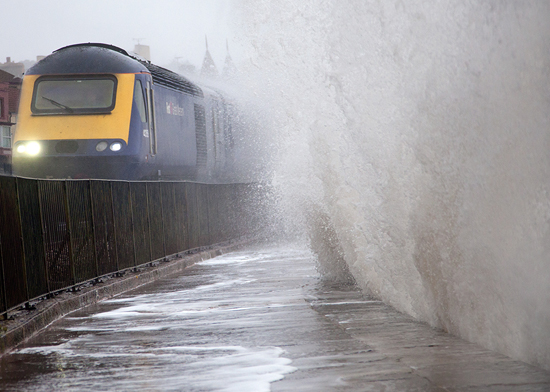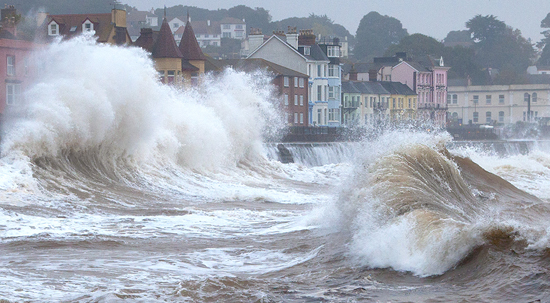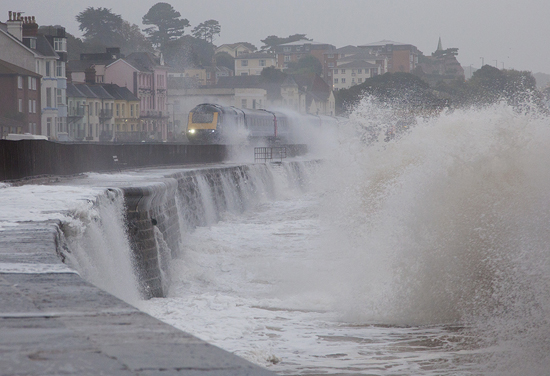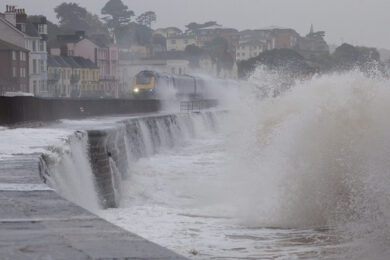Sonic Journeys, funded and supported by SoundUK, asks artists to produce a musical response to a set place or landscape in both urban and rural locations. The latest installment in the series is based on two railway journeys in Devon: the rural Tarka Line in the North of the County, and the section of the Great Western Mainline that runs right along the sea wall from the Exe Estuary past Dawlish Warren. Shackleton, last heard releasing a bass-heavy Fabric Live CD, produced the music for the two journeys, with poet Vengeance Tenfold supplying meditative lyrics on landscape, geology, and environment.
I took the Great Western Mainline route on an unseasonably hot Thursday, the day before Easter Bank Holiday. The air conditioning had broken, and the passengers who lost the bitter scramble for a seat stood irritated and sweating in the rattling spaces between the carriages, scented by a lightly braised toilet. Kids screamed in the heat, a burly and tattooed group angry that the bar has run out of Carlsberg started shouting, and there was no water in the taps. But when the train began to travel past the Exe estuary, with its attendant yachts, wrecks of fishing boats, the men with buckets collecting bait on the foreshore, the atmosphere changed, lightened, cooled. It was if that inviting mud drew the heat and tension out of us. This is when a PDF download instructed me to begin the track (it can be downloaded to laptop, iPod or phone) created by Shackleton and Vengeance Tenfold in response to what was unfolding outside my window.
SJ Shackleton Vengeance Tenfold South Devon line by soundukThe train made the grand curve through Dawlish and onto the coast. The sea was flat, but queasily so, the horizon obscured by haze and the water metallic. The small waves at the beach looked surly at the inconvenience of having to push children on their lilos and dinghys back to shore. But this, as the photographs above show, is a changeable sea. What’s so clever about the music and words created for this Sonic Journey is the sense that they’d suit whatever weather you’d encounter on this most remarkable stretch of railway line. The electronic thrum on my journey suited the stuffy heat, but on another day the claustrophobia would well accompany fog, or the tension the prospect of seeing a dirty wave rear up and spatter on the glass.
Vengeance Tenfold’s voice recites details of the geology of the area. What is geology but something that is unknown and invisible until water, Nature’s most powerful and durable cutting tool, begins its work to reveal the rocks and strata below the surface of the land? This thought heightens the strangeness of this railway as it traces the boundary between land and water. Britain is just rock, nature corralled by erosion into landscape and then by people into a nation: it rushes past on the right hand side of the carriage. On the other, the still intimidating and mysterious sea that (as inevitably as this train eventually reaching Penzance), will one day reclaim the concrete embankment, rust these rails, and start nibbling at the cliffs behind: "In the grand scheme of things the view that we are standing on solid ground is deceptive," intones the narration. There are plans to close this railway line, and replace it with one further inland, safe from the effects of time and tide. There will come a day when this music is one of the only records that it ever existed.
First, the most obvious question – how did you get involved with Sound UK and the Sonic Journey project?
Vengeance Tenfold: Well, they got in touch with Shackleton, and he got in touch with me. He lives in Berlin, so didn’t really get why they got in touch with him but passed it on to me as a sort of curiosity, but I, living in Devon, convinced him that it was actually a cool project to take on.
Did they give a firm brief as far as location went, or did you create it yourself?
VT: We were given the two stretches of train line, but were able to sort of pick out our favourite bits. The brief was two ten minute pieces of music, so obviously, on a half-hour-or-so train ride, there’s some scope for choice.
How did you decide on the locations?
VT: Well, there are just some especially interesting bits of landscape. The point where the train sort of turns right coming off the Exe estuary at Dawlish and cruises along between the sea and the cliffs on the way to Newton Abbot pretty much chooses itself; an awesome piece of Victorian engineering with natural forces in full effect. I’ve seen the waves blasting up over the tracks at Dawlish. Great stuff. In the north, it’s the stretch of country leading up to Barnstaple which has the strongest pull for me, anyway; proper Devon countryside. We met up with Mark from Beaford Arts, and he filled us in a bit on the UNESCO Biosphere designation of that area, which added to the attraction. It’s a unique part of Britain, and the fact that an international organisation says so makes it true, right?

We must bow to their wisdom. How did you start to explore this with Shackleton? Were your different roles quite clearly defined?
VT: Well, we took the train journeys together in the winter; snow everywhere. Then he went back to Berlin and the emails started flying. I’m always the ‘words’ man in our little collaborations, and he does the whole studio side. So our roles have defined themselves over the years without us having to think about it much. I should point out here that, in all honesty, Shack did the lion’s share of the work on the project; I have no skills in digital studio stuff, nor did I have much input on the musical side. If there had been stuff in the music that I didn’t like I suppose I would have been able to raise objections, but I’m really happy with the way the tracks turned out.
How did the creative process with Shackleton take shape?
VT: Emails! Sam showed me some sound-editing tricks and how to use a soundcard (truth be told, he gave me an old soundcard of his, and a nice studio mic. He knows I’m not much for buying gear), and I was able to send him good quality vocals in sync with some basic beats he had previously emailed me. It’s a good model, and we could work it again. I used Audacity, which is a super-basic open-source program for editing waveforms. Kids’ stuff. Sam sent riddims, I recorded lyrics, he went crazy in the studio in that inimitable Shackletonian manner.

Can you tell us about your experience of the Northern route? How did your approach differ?
VT: The line from Exeter to Barnstaple speaks to me way more than the southern route. Does that show up in the tracks? I have no idea. I live on a little Dartmoor farm, and it suits me down to the delightfully fertile, hilly ground.
I’d say that eh track for the North Devon Line sounds more oppressive, heavier. Is that in part because of the different landscape you were passing through and your personal reaction to it?
VT: Hmmm. I’ll buy that, actually. Those are some ancient, crowded hills, and the folks around there are mostly doing old school stuff, inasmuch as anyone is these days. The south coast has that cheesy, stuccoed-villa Fawlty Towers thing going on, so it lacks gravitas in a certain way.
I went through on the London express and wondered if you were conscious to make the piece work for both fast and slower trains?
VT: No! But great: the heretofore-undreamt-of express train adds an improvisational element to the listening experience. Or to put it another way, following some mechanical point-by-point itinerary would limit the possibilities for these tracks outrageously. I reckon people should steal old handcars from the railway museum and listen to the tracks while trucking along on those.
Did you have any intent or message with what you were writing, be that environmental or political?
VT: Yes. It’s there in the lyrics.

If you were to do another Sonic Journey, where would it be?
VT: Not sure if it would be a ‘Sonic Journey’, exactly, but I have a plan to go spend a summer travelling around Illinois and making loads of field recordings and basing a country album around it. I have a lot of things I’d like to say about me and Illinois. Not sure when I’ll find the time, but it’s a project that appeared in my skull recently, and I’d really like to do it. Probably won’t have Sam on board with that one, although maybe he’d be into doing a ‘Post-Apocalyptic Grain Silo Trainyard Hootnanny’ remix for the b-side of the single release.
To find out more about Sonic Journeys, please visit the project website. The next Sonic Journey will be presented by Micachu, of & The Shapes fame



